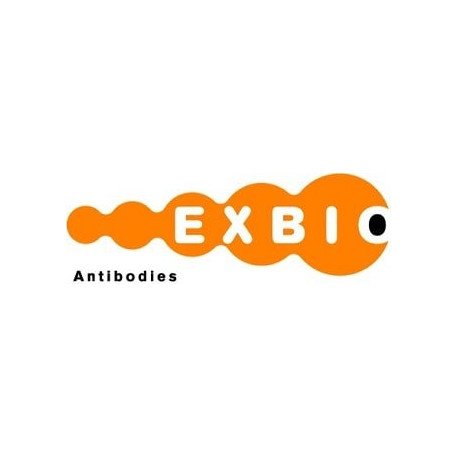Cart 0 Product Products (empty)
No products
To be determined Shipping
0,00 € Total
Prices are tax excluded
Product successfully added to your shopping cart
Quantity
Total
There are 0 items in your cart. There is 1 item in your cart.
Total products (tax excl.)
Total shipping (tax excl.) To be determined
Total (tax excl.)
Data sheet of Mouse Monoclonal to alpha, beta-tubulin dimer
| Brand | Exbio |
| Product type | Primary antibodies |
| Reactivity | Broad species reactivity |
| Clonality | Monoclonal |
More info about Mouse Monoclonal to alpha, beta-tubulin dimer
| Brand: | Exbio |
| Product no.: | 11-446-C025 |
| Product type: | Primary antibodies |
| Host species: | Mouse |
| Product name: | Mouse Monoclonal to alpha, beta-tubulin dimer |
| Antigen: | alpha, beta-tubulin dimer |
| Clonality: | Monoclonal |
| Clone: | TU-10 |
| Isotype: | IgM |
| Immunogen: | Microtubule proteins from porcine brain |
| Format: | purified |
| Specificity: | The antibody TU-10 recognizes alpha, beta-tubulin heterodimer, a basic intracellular structural unit of microtubules. Alpha- and beta-tubulins form approximately 100 kDa tubulin heterodimer, a globular protein that polymerizes to form microtubules. |
| Categories: | Cytoskeleton: Tubulin System (Veterinary), Cytoskeleton: Tubulin System (Rodent), Cytoskeleton: Tubulin System (Human), Cytoskeleton: Microtubular System |
| Concentration: | 1 mg/ml |
| Storage buffer: | Tris buffered saline (TBS) with 15 mM sodium azide, approx. pH 8.0 |
| Storage / stability: | Store at 2-8°C. Do not freeze. Do not use after expiration date stamped on vial label. |
| Background: | The microtubules are intracellular dynamic polymers made up of evolutionarily conserved polymorphic alpha/beta-tubulin heterodimers and a large number of microtubule-associated proteins (MAPs). The microtubules consist of 13 protofilaments and have an outer diameter 25 nm. Microtubules have their intrinsic polarity; highly dynamic plus ends and less dynamic minus ends. Microtubules are required for vital processes in eukaryotic cells including mitosis, meiosis, maintenance of cell shape and intracellular transport. Microtubules are also necessary for movement of cells by means of flagella and cilia. In mammalian tissue culture cells microtubules have their minus ends anchored in microtubule organizing centers (MTOCs). The GTP (guanosintriphosphate) molecule is an essential for tubulin heterodimer to associate with other heterodimers to form microtubule. In vivo, microtubule dynamics vary considerably. Microtubule polymerization is reversible and a populations of microtubules in cells are on their minus ends either growing or shortening – this phenomenon is called dynamic instability of microtubules. On a practical level, microtubules can easily be stabilized by the addition of non-hydrolysable analogues of GTP (eg. GMPPCP) or more commonly by anti-cancer drugs such as Taxol. Taxol stabilizes microtubules at room temperature for many hours. Using limited proteolysis by enzymes both tubulin subunits can be divided into N-terminal and C-terminal structural domains._x000D_ The alpha-tubulin (relative molecular weight around 50 kDa) is globular protein that exists in cells as part of soluble alpha/beta-tubulin dimer or it is polymerized into microtubules. In different species it is coded by multiple tubulin genes that form tubulin classes (in human 6 genes). Expressed tubulin genes are named tubulin isotypes. Some of the tubulin isotypes are expressed ubiquitously, while some have more restricted tissue expression. Alpha-tubulin is also subject of numerous post-translational modifications. Tubulin isotypes and their posttranslational modifications are responsible for multiple tubulin charge variants - tubulin isoforms. Heterogeneity of alpha-tubulin is concentrated in C-terminal structural domain._x000D_ _x000D_ The beta-tubulin (relative molecular weight around 50 kDa) is counterpart of alpha-tubulin in tubulin heterodimer, it is coded by multiple tubulin genes and it is also posttranslationally modified. Heterogeneity of subunit is concentrated in C-terminal structural domain. |
| Purity: | > 95% (by SDS-PAGE) |
| Purification: | Purified by precipitation and chromatography |
| General references: | *Cowan NJ, Dobner PR, Fuchs EV, Cleveland DW: Expression of human alpha-tubulin genes: interspecies conservation of 3' untranslated regions. Mol Cell Biol. 1983 Oct;3(10):1738-45. _x000D_ , *Linhartova I, Draberova E, Viklicky V, Draber P: Distribution of non-class-III beta-tubulin isoforms in neuronal and non-neuronal cells. FEBS Lett. 1993 Mar 29;320(1):79-82. _x000D_ |
| Related products: | - Mouse Monoclonal to ARAP1 / centaurin - Mouse Monoclonal to alpha-Fetoprotein - Mouse Monoclonal to alpha-tubulin |
| Shipping condition: | Room temperature |


